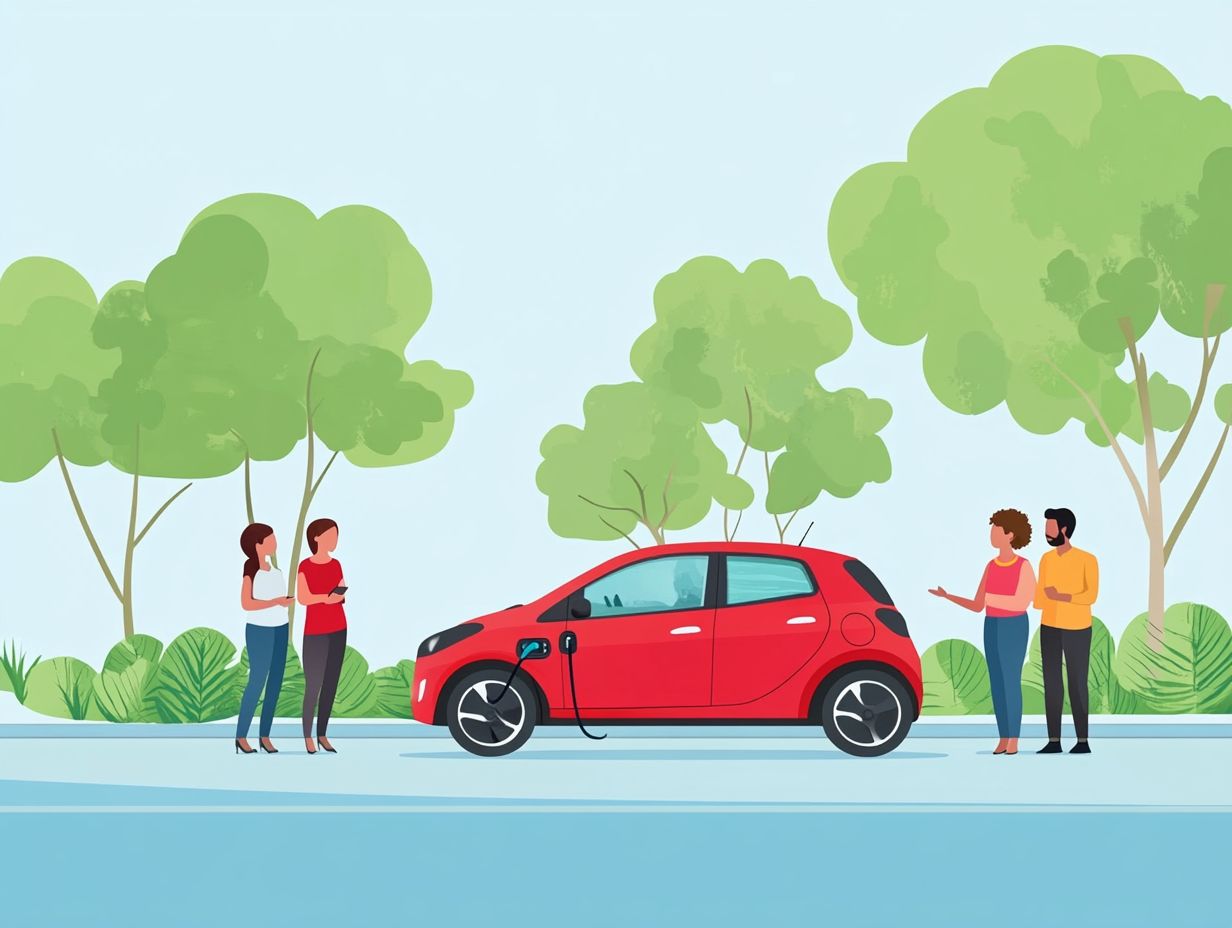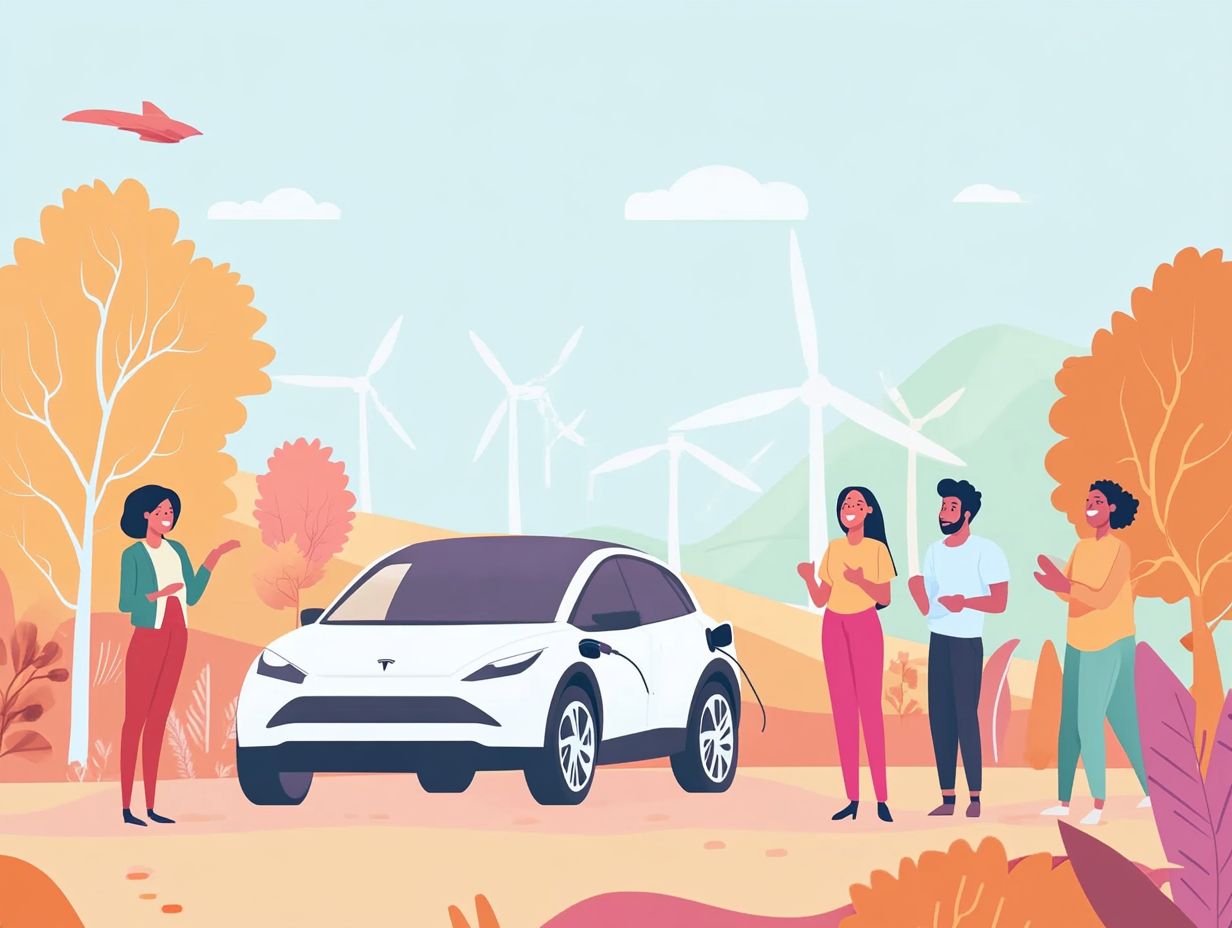the benefits of ev tax credits explained
Electric vehicle (EV) tax credits are a vital incentive encouraging eco-friendly transportation.
This article explores different types of EV tax credits, their benefits, and how they can lead to personal savings while promoting a cleaner environment. It also examines eligibility requirements and the process for claiming these credits.
Whether you’re thinking about buying an electric vehicle or curious about the benefits, this guide provides all the information you need.
Contents
Key Takeaways:

EV tax credits help you save money when purchasing an electric vehicle, making them more affordable. Switching to an electric vehicle positively impacts the environment by reducing pollution and promoting sustainable transportation.
Eligibility for these credits varies based on income and type of vehicle, so it’s crucial to research the requirements.
Understanding EV Tax Credits
Understanding federal EV tax credits for 2024 is important if you are considering an electric vehicle. These credits can significantly reduce your upfront costs.
Introduced under the Inflation Reduction Act, the federal EV tax credit encourages the adoption of clean vehicles and supports environmental sustainability. By offering tax breaks, this initiative motivates households to invest in electric vehicles (EVs) for a greener future, making it essential to explore understanding electric vehicle tax incentives.
This section delves into the purpose, types, and significance of EV tax credits for potential buyers.
What are EV Tax Credits?
EV tax credits are government incentives designed to motivate you to purchase electric vehicles. Their main goal is to promote clean energy and reduce pollution.
These credits let you deduct a specific amount from your federal taxes, lowering the cost of your new electric vehicle. Depending on the model and your eligibility, this could mean substantial savings.
These credits not only ease your initial costs but also accelerate the shift toward cleaner transportation. By promoting eco-friendly technologies, tax credits support the federal government’s clean energy initiatives, contributing to a sustainable environment for future generations.
Types of EV Tax Credits
There are various EV tax credits available, including those for new electric vehicles, used electric vehicles, and even for installing EV chargers at home.
These credits encourage electric vehicle adoption by making them more financially accessible. For example, new electric vehicles can qualify for a federal tax credit of up to $7,500, depending on factors like battery capacity and manufacturer eligibility.
There are also programs for purchasing used EVs, offering credits of up to $4,000, making it easier for budget-conscious buyers to enter the electric vehicle market.
If you re a homeowner, you can benefit from a federal EV charger tax credit, which allows for significant deductions on installation costs, further supporting your move toward sustainable energy solutions.
Benefits of EV Tax Credits
With EV tax credits, you can unlock amazing savings and help the planet. You’ll enjoy significant financial benefits while contributing to a cleaner environment.
Financial Savings

One of the key benefits of EV tax credits is the financial relief they offer, acting as a valuable tax break for those investing in electric vehicles. By understanding the tax benefits for EV owners, these credits can accumulate to thousands of dollars, significantly lowering the overall expense typically associated with purchasing an EV.
For instance, you could potentially receive up to $7,500 off your federal tax bill. Some states provide additional incentives that can yield even more savings. This transforms the purchase of a new electric car, which might initially seem like a stretch for your budget, into a far more attainable option when factoring in these tax breaks.
The ongoing savings from reduced fuel and maintenance costs create a compounding effect. Electric vehicles are not only an environmentally friendly choice but also a financially astute decision.
Environmental Impact
EV tax credits are important for cutting down carbon emissions and promoting clean energy. They create a positive impact on the environment as you make the shift toward electric vehicles.
These credits help lower your initial costs and foster the development of a robust infrastructure for charging stations. This shift means less reliance on fossil fuels, leading to cleaner air and a marked reduction in greenhouse gases.
As more individuals embrace EVs, the demand for renewable energy sources increases. This drives investment in wind, solar, and other sustainable technologies.
In this way, EV tax credits act as a catalyst for broader ecological benefits, and understanding tax deductions for EV purchases can further support initiatives that align with global goals for a greener future.
Government Incentives
The government presents an array of enticing incentives through the EV tax credit program. This encourages you to make the switch to electric vehicles while highlighting the benefits in the Inflation Reduction Act.
These incentives are designed to significantly lower the overall cost of purchasing an electric vehicle. This makes them much more accessible for a broader spectrum of buyers.
By offering substantial tax credits and rebates, the program seeks to dismantle the financial barriers that often hold potential customers back from embracing greener alternatives. As a result, you can anticipate considerable savings on your taxes.
You also benefit from reduced fuel costs and lower maintenance expenses. This initiative works now to shrink your carbon footprint, ultimately benefiting the environment while also giving a much-needed boost to the economy.
Eligibility for EV Tax Credits
Eligibility for EV tax credits hinges on several key factors. These include the type of electric vehicle you purchase, your income limits, and the specific qualifying vehicles detailed by the IRS.
Qualifying Vehicles
To get the EV tax credit, your vehicle must meet specific criteria established by the IRS. This includes being classified as an electric vehicle and fulfilling certain performance standards.
Your vehicle needs to be primarily powered by an electric motor, utilizing a battery that can be recharged from an external source. It should boast a battery capacity of at least 4 kilowatt-hours, ensuring you have ample range for everyday journeys.
Additionally, the vehicle s total weight when loaded must not exceed the government’s limitations, typically capped at around 14,000 pounds, to qualify.
Furthermore, the purchase price of your eligible electric vehicle should not exceed specific thresholds defined for the tax credit. These thresholds vary between cars, vans, and SUVs.
These specifications ensure that the benefits of the EV tax credit are effectively directed towards promoting energy-efficient and environmentally friendly transportation options.
Start exploring electric vehicles today and take advantage of these amazing benefits!
Income Requirements

Income requirements play a crucial role in determining your eligibility for the EV tax credit. There are specific limits based on your modified adjusted gross income (MAGI), which is your total income with certain deductions added back.
It’s essential for prospective buyers and those planning to invest in electric vehicles to understand how these income thresholds impact access to incentives. Your MAGI includes various forms of income and tax deductions, making it vital for you to assess your financial standing accurately.
To qualify for the full tax credit, your MAGI must remain below specific limits: generally set at $150,000 for single filers and $300,000 for joint filers.
If your income exceeds these thresholds, you might still qualify for a reduced credit. Being aware of these limits is crucial for maximizing your potential benefits.
How to Claim EV Tax Credits
Claiming EV tax credits involves following specific steps when filing your tax return. This includes completing Form 8936 in accordance with IRS regulations.
Process and Required Documentation
To successfully claim EV tax credits, complete Form 8936 and ensure you meet all IRS regulations regarding eligibility and documentation. This form is essential for anyone who has purchased an eligible electric vehicle since it specifies the credit amount based on the vehicle’s battery capacity.
Gather all necessary paperwork, including the vehicle’s purchase invoice and documentation proving its eligibility. This eligibility can typically be verified through the manufacturer or the IRS website.
Once you’ve filled out the form and any required schedules or documents accurately, submit it with your annual tax return.
It’s wise to keep copies of all submitted paperwork for future reference and potential audits. This ensures that the process is as seamless as possible.
Future of EV Tax Credits
The future of EV tax credits is set for notable changes as the government assesses their effectiveness and explores potential adjustments, especially concerning commercial EVs and the changing demands of consumers.
Potential Changes and Updates
Potential changes to the EV tax credit program may be on the horizon, driven by recommendations from the Treasury Secretary and updates in IRS regulations. These are designed to better support you, the consumer, and the electric vehicle market.
These adjustments could signify a broader commitment to sustainability, positioning electric vehicles as a compelling alternative to traditional combustion engines. Stay informed about these updates, as they could enhance eligibility criteria and provide incentives for a diverse range of consumers.
New IRS guidelines might soon clarify the benefits tied to these tax credits, making it simpler for you and businesses to navigate options for participation. Ultimately, these modifications aim to accelerate adoption rates and ensure that the electric vehicle sector thrives in an increasingly eco-conscious world, highlighting the long-term benefits of EV incentives.
Frequently Asked Questions

What are EV tax credits?
EV tax credits are incentives provided by the government to encourage the purchase and use of electric vehicles (EVs). These credits are usually applied as a deduction on the taxes owed by the EV owner.
How do EV tax credits benefit me?
EV tax credits can significantly reduce the purchase price of an electric vehicle, making it more affordable for consumers. This allows people to switch to a more environmentally friendly mode of transportation without breaking the bank.
Are there income limitations for EV tax credits?
Yes, there are income limitations for EV tax credits. The amount of credit you can receive depends on your tax liability, and there is a phase-out period for individuals with higher incomes.
Do all electric vehicles qualify for tax credits?
No, not all electric vehicles qualify for tax credits. The vehicle must meet certain requirements set by the government to be eligible for the credit, including factors such as battery capacity and maximum speed.
Can I claim EV tax credits for multiple vehicles?
Absolutely! You can claim EV tax credits for multiple vehicles as long as they meet the rules set by the government. Remember, the total amount is limited to $7,500 per individual per tax year.
Will the EV tax credits be available indefinitely?
No, they won t be around forever! Once a certain number of electric vehicles sell, these credits will start to disappear. Act quickly to take advantage of these savings!






